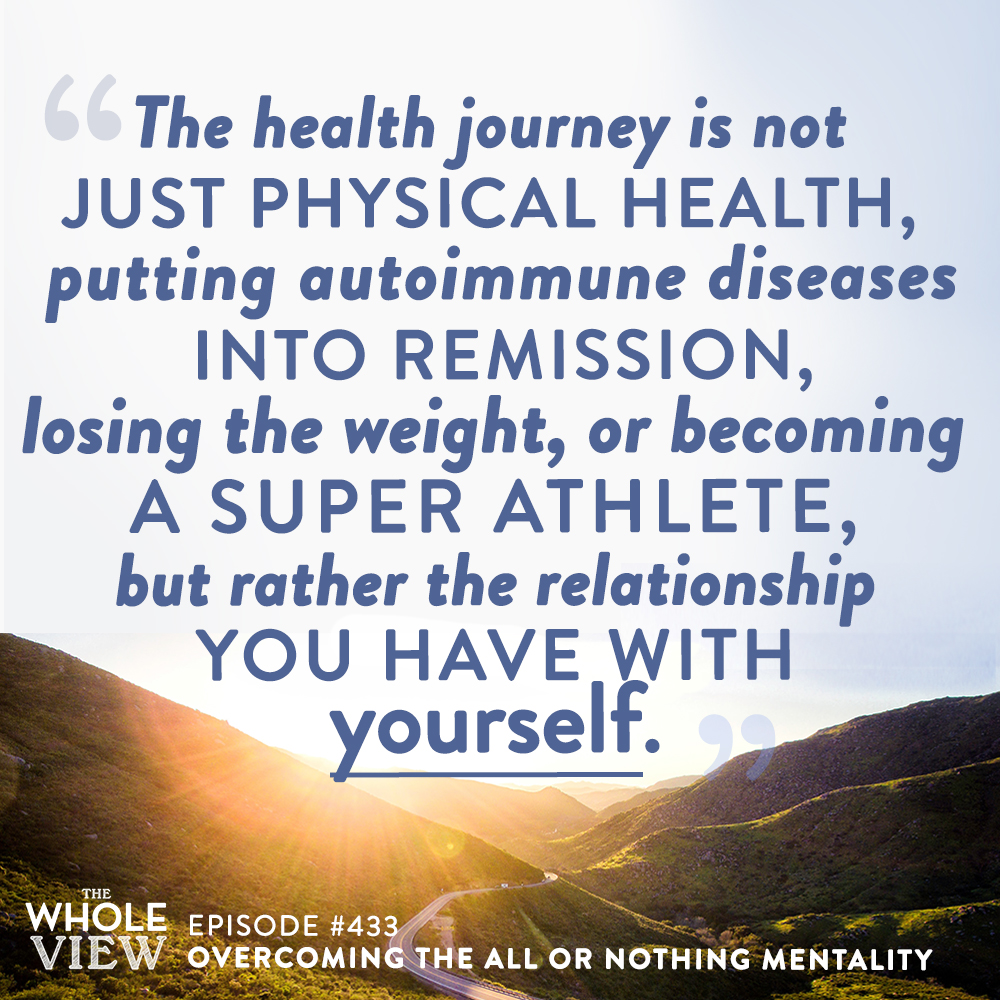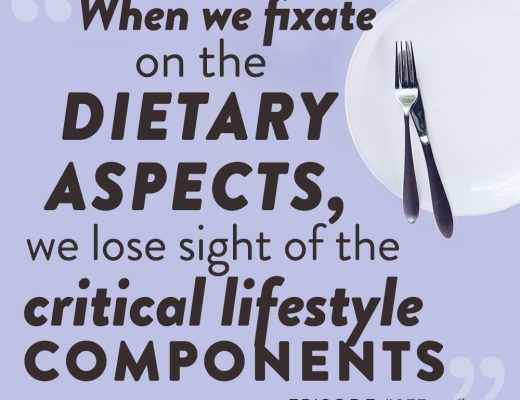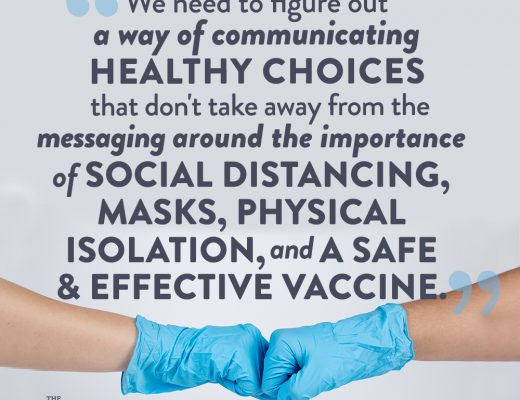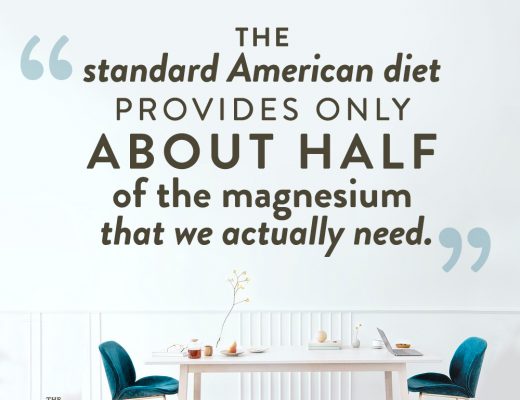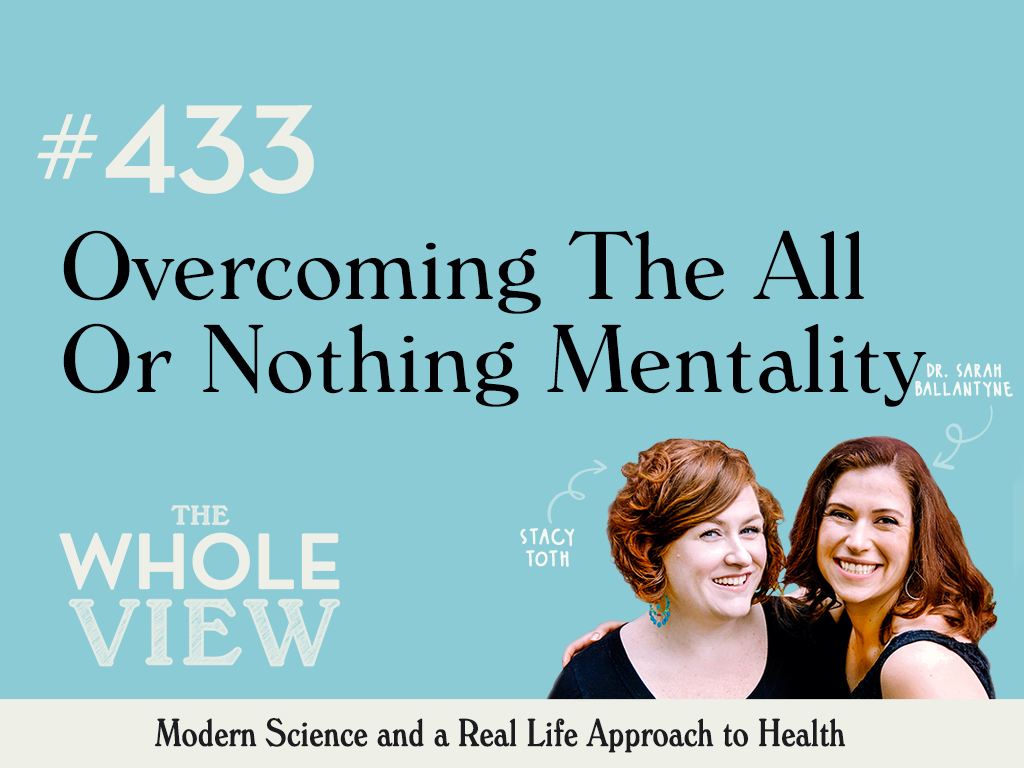
Welcome to episode 433 of The Whole View! This week, Stacy and Sarah review two listener questions that tackle an all or nothing mentality when it comes to dietary choices.
If you enjoy the show, please review it on iTunes!
The Whole View, Episode 433: Overcoming The All Or Nothing Mentality
Stacy starts the show by asking Sarah how she is today. (2:37)
Sarah tells Stacy that they’ve actually gotten “snow” in Atlanta, which to everywhere else isn’t even a dusting, but for Sarah, it’s very exciting.
She is from Canada but actually lived in an area that didn’t get a lot of snow annually.
Stacy is excited since this week they received a few questions from listeners. It’s been a while since they’ve gone back to the “old school” question episodes.
Sarah explains that two questions came in that came in were a similar challenge but from opposite sides.
She thinks this is an excellent time to talk about mindset, especially as we get into the holiday season.
Question From Listener Rick
I am inquiring because I am lost. I have been eating the same foods for well over a year now. And I mean the same. In my mind, that is better than eating non-AIP (I have mild psoriasis/dandruff (has been constant for over 5 years) and alopecia (not so much anymore, but the bald spots are still there).
My inquiry is this: would it be at all possible for you to create a single ideal day that achieves an optimal level of nutrients (both micro and macro)? I mean, a single day’s worth of food that has the utmost ideal macronutrient breakdown (i.e. 2500 calories, 200g carbs, etc.) and, more importantly, receives as many and as wide an array of micronutrients as humanly possible in a single day?
I am desperate to change this. I know this single element is holding me back. Heck, I’ve even just bought the AIP Cookbook, but because of budgeting and kitchen space (I live at home), I do not have the equipment for a lot of the recipes (i.e. deep fryer, that vegetable grinder) and because of my complete unfamiliarity with cooking ingredients and lack of understanding how to attain a level of micronutrients and macronutrients (I absolutely know I am not eating enough calories for a young male/wannabe athlete), I simply resort to eating the same easy to prepare and familiar foods and end up in a rut and resort to binge eating or drink. I do not want to be like this, but I don’t know where to start.
Thoughts and Feedback
Stacy shares that this is how her husband, Matt, feels about food.
He’s waiting for that one product that comes out where he gets everything he needs by eating that one thing. And he no longer has to think about it.
Stacy understands how overwhelming everything they talk about can be.
She lets listeners know that you don’t need a deep fryer or vegetable grinder to be AIP, focus on healthy choices, or get enough variety.
Stacy hopes by focusing on expanding your concept to a three-day plan where you rotate things can help listeners get there.
She also reminds listeners that she and Sarah are not medical professionals or nutritionists.
And that meal and nutrition plans are a great thing to sort out with a professional if it’s something you’re struggling with.
Sarah also recommends reaching out to an AIP coach because their purpose is to work with you to develop a strategy that works best for your specific goals.
Question From Listener Jen
First of all, you and Stacy continually BLOW MY MIND, in regards to the information and balanced insights you bring to your podcast. I want to thank you very much for your work. You ARE accomplishing the change in people’s lives by what you teach with the hard core science. I’m a science nerd too – EVERY time I listen, I am floored by the what I learn. Your podcast deserves the highest praise.
Ok now for brass tacks.
My inquiry isn’t perhaps very specific, but rather has to do with how one goes about implementing nutrition and lifestyle changes to make the transition to better health, better eating habits, in short my question is this- When and how to make the plunge?
I’ve heard you say there are levels of involvement, from eating more microbiome supporting foods, to next level support with supplements. Still, we have in our family, with our son, a potential autoimmune condition looming on the horizon. We aren’t there yet….thankfully but!
Am I being a fool to not implement an AIP diet for him? Can we just go ahead and implement it and see what happens? Is it ok to follow AIP even if you don’t need to? I like to think I’m capable of doing this protocol by myself, or by following your workshop. Does one need to have the added support of a functional physician too?
Ok I realize you’re not in the business of advising a course of action to take. But perhaps you have a personal perspective from which to speak from?
Thanks once again. Jen from Toronto, C-A-N-A-D-A
Thoughts and Feedback
Stacy underlines how important it is to not let perfection become the enemy of the good in doing the best you can as often as you can. (11:17)
The important thing is to make improvements over time.
Sarah says she sees this roadblock to progress a lot.
She explains how important it is to look at health, in general, because the goal here is lifelong health. And we’re not looking so much at short-term goals.
Sarah adds how helpful it is to look at everything we do in the day as something that contributes to that ultimate goal of health.
The idea is to make as many healthy choices as we can throughout the day to serve toward this long term-goal.
And we don’t need every single choice to be optimal in order to get there.
Sarah urges not to look at each choice as something that needs to be perfection, and if you can’t do perfect, you might as well not at all.
She says to instead look at it as a collection of individual, small choices that each can contribute to this lifelong goal of overall health.
The All or Nothing Mentality Roadblock
Sarah shares she also struggled with the all or nothing mentality for years. (16:07)
She also adds that looking at food as part of that health journey is a good way to start.
Stacy says one of the things that her a lot is looking into diet culture and nutrition, especially coming from a background with disordered eating.
We think of ourselves as bad if we eat a bad food, and that’s simply not true.
It’s about focusing on what is best for you.
Stacy thinks focusing too much on the rules, limiting ourselves, and coming into a very narrow box, it can be detrimental to our emotional health.
At the same time, when you reach whatever “goal” you were aiming for, for exampled weight loss, people tend to yo-yo to unhealthy habits because we can’t sustain these strict rules.
The goal isn’t to permanently restrict these things. It’s to get you to a place where you feel good and then figuring out how to keep it that way.
Stacy’s Experience With The All or Nothing Mentality
Stacy shares her own experience of turning 30 years old. (20:01)
She had been doing paleo for about a year and was obsessed with losing weight.
And she used paleo and achieving “health” as a means to justify her obsessive eating habits.
The stress of it was causing so much harm to her body. And she took to focusing more on what she could have rather than what she couldn’t have.
This was she could focus on nutrients she was giving her body, rather than the number on the scale.
Her weight may be more now than it was then, but she knows she’s healthier than she was back then as well.
Sarah’s Experience With The All or Nothing Mentality
Sarah shares that she had a similar experience right around the time she started paleo. (23:16)
She was obese as a teenager because of undiagnosed hypothyroidism and yo-yo dieting.
In college, she learned about a fad diet that was low-carb and over the course of a year, lost about 100 pounds.
She also IGNORED all of the health issues that were so much worse because of it.
It was around that time she was diagnosed with her first autoimmune disease.
The Turning Point
Eventually, she had such a bad flare with asthma that caused her to actually cough up blood.
That’s when she went from “all” where she was running marathons and dieting, to “nothing” where just walking across the room was a struggle.
The high doses of steroids she was on made her binge eat, and she gained a lot of the weight back in the first few weeks.
It created a lot of emotional challenges for her because she was so rapped up in the worth she got out of weight loss and being active.
All the stress she was under and lack of self-worth spiraled her into a depression, and she gained even more weight than she had in high school.
She yo-yoed back to a low-carb diet, lost a lot of the weight, and saw all the autoimmune flareups she saw in grad school again.
Looking at her skin, and her health, and how she felt, turned her to paleo and researching nutrition.
Her goals changed from wanting to be thin to wanting to be healthy.
Combating that all or nothing mentality meant reevaluating what mattered to her.
For Sarah, what drove her away from an all or nothing mentality to nutritional eating wasn’t weight loss or autoimmune diseases, like the ones in the listener questions.
It was strengthening the relationship she had with herself and her own body that broke the cycle.
Getting Over The All Or Nothing Mentality
Stacy shares the only way to get over the all or nothing mentality in relationship to food health is to come at it from a place of wanting to love, respect, and nourishing your body. (31:45)
That is the only way to be successful at it.
She hopes by coming at this topic from the focus of health, it can help listeners find success.
When asking yourself why you’re on this health journey, Stacy underlines how important it is to be honest with yourself about your answer.
If the answer it, “I want to be healthy because I’d like to lose a little weight” or “I’d like to perform better in my upcoming race,” that’s not an answer that will help you sustain it long term.
Stacy revisit’s Ricky’s question and says how difficult it would be to provide one day’s worth of meals that covers all bases.
It would require cover all the bases like 30 variations of fruits and vegetables, different variations in the types if proteins being consumed, seafood, healthy fats, and all the micronutrients the body needs in just one day.
Stacy also points out that eating a handful of nuts can give you enough of a mineral for a whole week, so you won’t need to eat it every day.
The key here is to change the relationship we have with food by making small changes over time.
Stacy recommends looking into foods that checks of several “boxes,” like mushrooms, and eating that once or twice a week would help Rick simplify while covering more bases.
So, What Can Ricky Do?
Sarah suggests they narrow in on the specifics they can answer on the questions. (35:16)
She reminds listeners that in Episode 424 she and Stacy dove deep into how and why diversity is so essential to a healthy diet.
This means there are so many ways to achieve nutrient sufficiency, especially when incorporating nutrient-dense superfoods.
And there are so many nutrients we don’t track (like phytonutrients) where we know diversity is key.
Sarah explains that getting enough of phytonutrients is what’s really important here.
So it’s really important to get comfortable mixing up food choices day-to- day.
When you focus on a wide range of veggies, fruit, and mushrooms, a few servings per week of organ meat and seafood, it’s actually pretty easy to optimize nutrients.
Sarah recommends when stuck in a food rut, it’s an easy place to start.
Sarah suggests trading winter squash for sweet potato, spinach for lettuce, pear for apple, trout for salmon, turkey for chicken.
Those trades can dramatically increase nutrient diversity.
Food Journaling As A Tool
A great resource Sarah has her AIP Lecture Series students use is cron-o-meter (myFitnessPal works too).
In the first week of the course, she has them do a 3-day food diary, ideally without letting food journaling change what they’re eating. It’s harder than it sounds!
Sarah also tells listeners that food journaling is scientifically one of the best tools we can use.
Then they do several activities with that diary.
One important activity is to identify micronutrients that we’re consistently falling short on. And use the USDA food database or a website like nutritiondata.self.com to peruse foods.
Sarah also has printables in the course with best food families for each nutrient, which are also in Paleo Principles.
Then they identify foods that they could add to their diet to meet the shortfalls they find.
She always talks about calcium and vitamin E, since those are such common shortfalls on the AIP.
Sarah suggests looking at it as a game and learning that there are many choices that can act as the same game or puzzle piece.
She also explains that adding variation does have to mean trading out comfort or favorite foods, but rather making choices around them.
As someone who struggles with intuitive eating due to a past of disordered eating, periodic journaling is a great way for Sarah to check in with herself.
She also adds that enrollment for her class is now open for Jan 18th, 2021!
What Can Jen Can Do?
Stacy brings things back to emotions for a moment and says how hard this can be for a parent. (42:01)
She underlines you are not to blame or to feel guilty as a parent because you weren’t doing it before. When you know better, you know better.
Stacy tells listeners you can’t go back in the past and change it. So there is no point in feeling guilty about it.
She also says there are no many different ways to approach it with kids.
Transitioning When Intimidated
Sarah explains that AIP isn’t something you need to rip the bandaid off and go on in if you’re a little intimidated by it.
The AIP Lecture Series course is laid out so that you can transition iteratively as you learn about each facet.
Sarah also includes a thorough discussion on how to transition with the goal of being able to stick with AIP all the way through to the maintenance phase.
She always recommends choosing a transition method that fits your needs and personality.
- How do you do better with change: one step at a time or cold turkey?
- With autoimmune disease, how serious is it?
- Is it bad enough to go cold turkey AIP even though you would normally tackle change more effectively iteratively?
With kids, Sarah generally thinks iterative change tends to work better.
You definitely want to talk to them about it and get their buy-in.
She recommends this as a good place to start:
- Gluten-free, dairy-free, soy-free
- Work on eating more nutrient-dense superfoods
- Find new favorites but try not to overly rely on gluten-free grains or nuts that might need to be eliminated later
- Sleep (so important with kids!),
- Stress management (mindfulness)
- Appropriate activity levels
Sarah explains that her kids are odd because they go to bed so much earlier than their peer groups.
But most of those kids who go to bed at 9 or 10 o’clock aren’t getting the adequate sleep their body needs for their age.
Sarah also explains that doctors are a great resource to keep in the loop, but they are not a necessity.
No doctor is going to have an issue with you focusing on a nutrient-rich diet.
Sarah also advises parents to be patient. It does take a while for our tastebuds to change.
So transitioning to new foods, especially for kids, can take some time.
The Benefits Of AIP
The AIP is a nutrient sufficient and balanced diet and is a great health-supporting diet for anyone.
Some foods are eliminated that are very nutrient-dense, which is why reintroductions are so important.
Sarah’s family did AIP Plus, so those early reintroduction foods were never eliminated in the first place.
One of the things that she teaches in the AIP Lecture Series is priorities to help guide transition and balance within a family
It really helps to thoroughly understand the ins and outs of the AIP.
And helps to guide iterative transitions and modify for best sustainability and balance.
Final Thoughts On The All Or Nothing Mentality
Sarah explains that it took her family about 2 years to get to a place where she was happy with their diets and her kids could eat organ meat without making faces.
Stacy jokes that her kids are not eating organ meat or going to bed before 9. But that’s okay, because it’s a journey.
They are all doing the best that they can every day that they can.
She also jokes that her kids sleep in later than Sarah’s.
Stacy turns listeners to the melatonin show for anyone interested in more information about sleep.
Stacy revisits Jen and Ricky’s question about how to make this all simpler.
She advises all listeners to just do the best that they can, as often as they can, not to live with guilt or stress over it.
Stacy thanks them both for submitting a question and invites anyone listening with a question to submit one.
Also, for any listener wanting more of Stacy and Sarah, she invites you to join their Patreon family for bonus content.
Thank you so much for tuning in!
